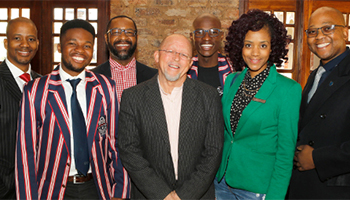Latest News Archive
Please select Category, Year, and then Month to display items
12 October 2020
|
Story Arina Engelbrecht
|
Photo Supplied
 Arina Engelbrecht from Organisational Development and Employee Well-being believes physical activity has a number of benefits for one’s health, including stress relief.
Arina Engelbrecht from Organisational Development and Employee Well-being believes physical activity has a number of benefits for one’s health, including stress relief.
Being physically active plays a big role in preventing the development of mental-health problems and in improving the quality of life of people experiencing mental-health problems.
Treatment for depression
Physical activity can be an alternative treatment for depression. It can be used as a stand-alone treatment or in combination with medication and/or psychological therapy. It promotes all kinds of changes in the brain, including neural growth, reduced inflammation, and new activity patterns are formed that promote feelings of calm and well-being. It releases endorphins – powerful chemicals in the brain that energise your spirit and make you feel good.
Physical activity can be very effective in relieving stress. Research in adults has found that physically active individuals tend to have lower stress levels compared to individuals who are less active. It also leads to improved sleep. When a person sleeps better and feels more rested, overall quality of life improves. They cope better with daily life stressors.
Reduce Alzheimer's risk
Regular physical activity can reduce your risk of developing Alzheimer's disease by up to 50%. It can also slow down further deterioration in those who have already started to develop cognitive problems. It stimulates the brain’s ability to maintain old connections as well as to make new ones.
A study asked people to rate their mood immediately after periods of physical activity (e.g. going for a walk/run, cycling, doing housework) and periods of inactivity (e.g. reading a book or watching television). Researchers found that participants felt more content, more awake, and calmer after being physically active compared to after periods of inactivity.
In conclusion, people who are physically active feel a sense of well-being, feel more energetic throughout the day, sleep better at night, have sharper memories, and feel more relaxed and positive about themselves and their lives.
“Being physically active not only changes your body, it changes your mind,
attitude, and your mood.” – Arina Engelbrecht
Student leaders take the lead by launching SRC Fund
2017-08-24

The Student Representative Council (SRC) launched the SRC Fund
at a Business Breakfast on the Bloemfontein Campus.
Photo: Johan Roux
The Student Representative Council (SRC) is not just asking for financial help, but is taking the lead by launching the SRC Fund. According to different guest speakers at a recent SRC Business Breakfast, the student leadership of the University of the Free State (UFS) is setting an example.
“They (the SRC) are saying to us and to you: We are not just saying that we want free education in our lifetime. We are also prepared to assist government in assisting universities however we can in that direction,” says Pura Mgolombane, Dean of Student Affairs at the UFS.
Objectives of fund
The SRC launched the SRC Fund on 4 August 2017 at the Centenary Complex on the Bloemfontein Campus in order to fight against financial exclusion of students. The fund aims to centre all forms of fundraising initiatives by students, decreasing financial barriers to UFS entry, and utilising and maximising networks within business enterprise, former SRC members, alumni, and student fundraising initiatives. It also wants to help with the creation of exposure and mentorship programmes, funds to assist with registration and financial exclusions, entrepreneur development, partnership opportunities, and increasing employment opportunities.
Initiatives such as Right2Learn will in future form part of the fund, and fundraising initiatives such as The Cycle Tour and Kovsies Biggest Braai has also been launched.
Internal and external partnerships
Prof Nicky Morgan, Vice-Rector: Operations at the UFS, says the SRC leadership is not just asking for money. He says they are a “can do leadership” who is asking others to help them to be successful. He also stressed the important relationship between the university and the city and asked that they should work together.
Sikhululekile Luwaca, President of the Bloemfontein SRC, said the SRC wants to “build internal and external partnerships, because universities are microcosms of society”.
“We cannot do it alone and that is why we are trying to bring the business part of it, the corporate enterprise, to also assist the SRC Fund to become sustainable.”